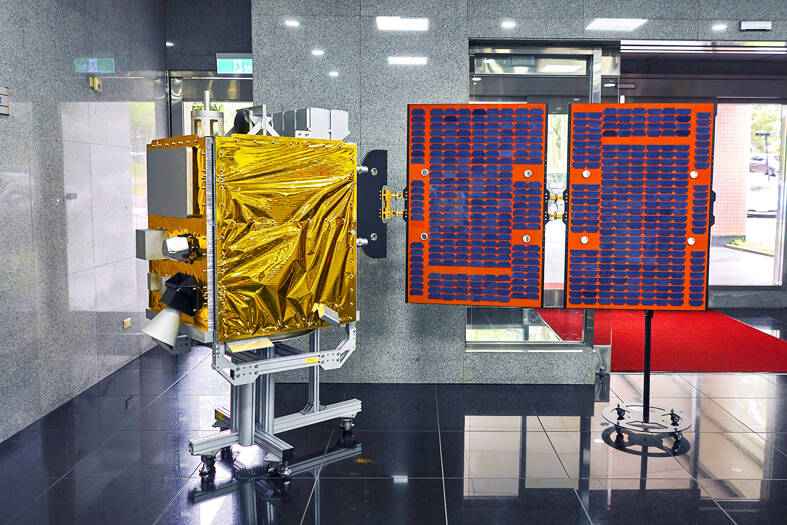A domestically engineered weather satellite is to depart Taiwan today for French Guiana, where it is to be launched in September, the Taiwan Space Agency said on Monday.
The agency said that the Triton Wind-Hunter Satellite is to be put into orbit on an Arianespace Vega C rideshare mission.
To get the satellite ready for launch, a pre-shipment review was initiated in the middle of last month, with 15 inspectors completing final checks, the agency said.

Photo: An Rong Xu, Bloomberg
Triton project manager Lin Chen-tsung (林辰宗) said that the two-day review included assembly testing, instrument verification and environment adaptability, while tests were also run to ensure that ground computers controlling the satellite would operate smoothly.
The review showed that all of the specifications were up to standard, Lin said.
The space agency said that the satellite was clear to be transported following inspections and follow-up questions from the review board.
Taiwan Space Agency Director-General Wu Jong-shinn (吳宗信) said that the Triton project was initiated in 2014 and has reached the launch phrase after eight years of hard work.
Triton is Taiwan’s first domestically engineered weather satellite and was built with many domestic components, including Taiwan’s own global navigation satellite system-reflectometry (GNSS-R), Wu said.
The GNSS-R is a data-processing module developed by the agency and the Central Weather Bureau, along with other technology and meteorology experts to collect sea surface wind data that would be combined with ground radar wind field data to more accurately predict heavy rainfall and the paths of typhoons.
Triton is to be launched into a low Earth orbit at an altitude of 550km to 650km, the agency said.

CHANGING LANDSCAPE: Many of the part-time programs for educators were no longer needed, as many teachers obtain a graduate degree before joining the workforce, experts said Taiwanese universities this year canceled 86 programs, Ministry of Education data showed, with educators attributing the closures to the nation’s low birthrate as well as shifting trends. Fifty-three of the shuttered programs were part-time postgraduate degree programs, about 62 percent of the total, the most in the past five years, the data showed. National Taiwan Normal University (NTNU) discontinued the most part-time master’s programs, at 16: chemistry, life science, earth science, physics, fine arts, music, special education, health promotion and health education, educational psychology and counseling, education, design, Chinese as a second language, library and information sciences, mechatronics engineering, history, physical education

The Chinese military has boosted its capability to fight at a high tempo using the element of surprise and new technology, the Ministry of National Defense said in the Quadrennial Defense Review (QDR) published on Monday last week. The ministry highlighted Chinese People’s Liberation Army (PLA) developments showing significant changes in Beijing’s strategy for war on Taiwan. The PLA has made significant headway in building capabilities for all-weather, multi-domain intelligence, surveillance, operational control and a joint air-sea blockade against Taiwan’s lines of communication, it said. The PLA has also improved its capabilities in direct amphibious assault operations aimed at seizing strategically important beaches,

‘MALIGN PURPOSE’: Governments around the world conduct espionage operations, but China’s is different, as its ultimate goal is annexation, a think tank head said Taiwan is facing a growing existential threat from its own people spying for China, experts said, as the government seeks to toughen measures to stop Beijing’s infiltration efforts and deter Taiwanese turncoats. While Beijing and Taipei have been spying on each other for years, experts said that espionage posed a bigger threat to Taiwan due to the risk of a Chinese attack. Taiwan’s intelligence agency said China used “diverse channels and tactics” to infiltrate the nation’s military, government agencies and pro-China organizations. The main targets were retired and active members of the military, persuaded by money, blackmail or pro-China ideology to steal

DEADLOCK: As the commission is unable to forum a quorum to review license renewal applications, the channel operators are not at fault and can air past their license date The National Communications Commission (NCC) yesterday said that the Public Television Service (PTS) and 36 other television and radio broadcasters could continue airing, despite the commission’s inability to meet a quorum to review their license renewal applications. The licenses of PTS and the other channels are set to expire between this month and June. The National Communications Commission Organization Act (國家通訊傳播委員會組織法) stipulates that the commission must meet the mandated quorum of four to hold a valid meeting. The seven-member commission currently has only three commissioners. “We have informed the channel operators of the progress we have made in reviewing their license renewal applications, and